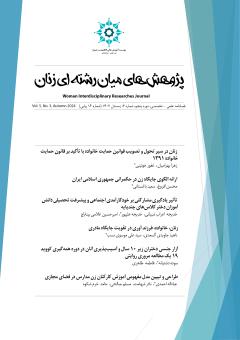تأثیر یادگیری مشارکتی بر خودکارآمدی اجتماعی و پیشرفت تحصیلی دانشآموزان دختر کلاسهای چندپایه
محورهای موضوعی :خدیجه اعراب شیبانی 1 , خدیجه علیپور 2 , امیرحسین غلامی بیناباج 3
1 - استادیار، روانشناسی، پیام نور، تهران، ایران.
2 - استادیار، روانشناسی، پیام نور، تهران، ایران.
3 - کارشناسی ارشد، روانشناسی تربیتی، پیام نور، تهران، ایران.
کلید واژه: یادگیری مشارکتی - خودکارآمدی اجتماعی - پیشرفت تحصیلی -کلاسهای چندپایه,
چکیده مقاله :
پژوهش حاضر تأثیر یادگیری مشارکتی بر خودکارآمدی اجتماعی و پیشرفت تحصیلی دانشآموزان دختر در درس قرآن کلاسهای چندپایه را موردبررسی قرارداد. روش پژوهش، نیمهآزمایشی و از نوع پیشآزمون_ پسآزمون با گروه کنترل بود. برای اندازهگیری متغیرها از پرسشنامه خودکارآمدی اجتماعی Ladd&Wheeler (1982) و آزمون پیشرفت تحصیلی استفاده شد. بهمنظور اجرای طرح پژوهش از میان مدارس چند پایه، دو کلاس به روش نمونهگیری در دسترس انتخاب و به عنوان گروه آزمایش (n=15) و گروه گواه (n=15) در نظر گرفته شد. آزمون پیشرفت تحصیلی و پرسشنامه خودکارآمدی اجتماعی بهمنزلة پیشآزمون برای هر دو گروه انجام شد. گروه آزمایش در 15 جلسه (45 دقیقه) درس قرآن را بهصورت مشارکتی، آموزش دیدند، اما گروه گواه در طول مدت اجرا، به روش رایج آموزش دیدند. بعد از پایان دوره آموزش، از هر دو گروه پسآزمون به عمل آمد. دادهها با استفاده از روش تحلیل کوواریانس، مورد تجزیهوتحلیل قرار گرفت. نتایج، برتری معنادار گروه آزمایش را در پیشرفت تحصیلی درس قرآن نشان داد، ولی در زمینة خودکارآمدی اجتماعی، تفاوت معناداری بین گروهها مشاهده نشد.
The present study examined the impact of collaborative learning on social self-efficacy and academic achievement of female students in the Qur'an lesson of multi-grade classes. The research method was semi-experimental with a pre-test-post-test design and a control group. To measure the variables, Ladd and Wheeler's social self-efficacy questionnaire and the academic achievement test in the Qur'an lesson were used. Two classes were selected through convenient sampling, one was as the experimental group (n=15) and the other as the control group (n=15). Pre-tests were administered to both groups using the academic achievement test and the social self-efficacy questionnaire. The experimental group received Qur'an lessons through collaborative learning in 15 sessions (45 minutes), while the control group was taught using traditional methods. Post-tests were administered to both groups after the intervention period. The data was analyzed using covariance analysis. The results showed the significant superiority of the experimental group in the academic improvement in academic achievement for the experimental group in the Qur'an course, but no significant difference was observed between the groups in terms of social self-efficacy.
